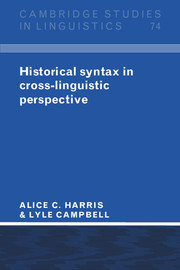Book contents
- Frontmatter
- Contents
- Preface
- List of abbreviations
- 1 Introduction
- 2 The history of historical syntax: major themes
- 3 Overview of a theory of syntactic change
- 4 Reanalysis
- 5 Extension
- 6 Language contact and syntactic borrowing
- 7 Processes that simplify biclausal structures
- 8 Word order
- 9 Alignment
- 10 On the development of complex constructions
- 11 The nature of syntactic change and the issue of causation
- 12 Reconstruction of syntax
- Appendix
- Notes
- References
- Index of languages and language families
- Index of scholars
- Index of subjects
11 - The nature of syntactic change and the issue of causation
Published online by Cambridge University Press: 05 June 2012
- Frontmatter
- Contents
- Preface
- List of abbreviations
- 1 Introduction
- 2 The history of historical syntax: major themes
- 3 Overview of a theory of syntactic change
- 4 Reanalysis
- 5 Extension
- 6 Language contact and syntactic borrowing
- 7 Processes that simplify biclausal structures
- 8 Word order
- 9 Alignment
- 10 On the development of complex constructions
- 11 The nature of syntactic change and the issue of causation
- 12 Reconstruction of syntax
- Appendix
- Notes
- References
- Index of languages and language families
- Index of scholars
- Index of subjects
Summary
Introduction
In the preceding chapters we have laid out a framework for the study of diachronic syntax. We have examined the nature of syntactic change in detail from the point of view of specific mechanisms (chapters 4–6) and from the point of view of certain recurrent types (chapters 7–10). In this chapter we take up questions relating to syntactic change as a whole. Earlier in this book, in chapter 1, we only briefly introduced the topic of the explanation of change and associated notions of prediction and causation, touching upon them briefly in later chapters in connection with specific changes. We have not yet drawn these points together to provide a general statement on explanation, causation, and prediction. Moreover, two important aspects of the nature of syntactic change have thus far been left unexamined, namely regularity and directionality. Our goal in this chapter is to consider these matters that bear importantly on the overall nature of syntactic change. Throughout, our discussion is informed by the investigations of individual changes reported in earlier parts of this work, as well as by our separate and collaborative investigations into a diverse array of languages.
- Type
- Chapter
- Information
- Historical Syntax in Cross-Linguistic Perspective , pp. 314 - 343Publisher: Cambridge University PressPrint publication year: 1995



